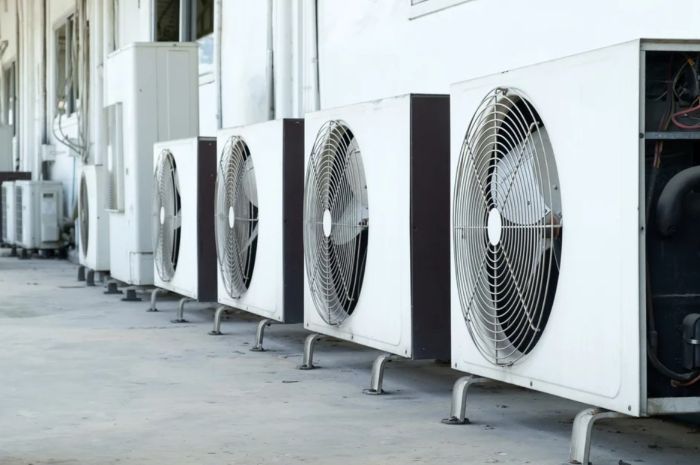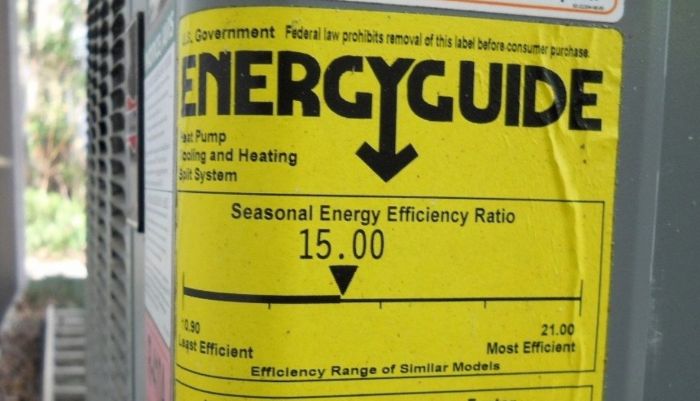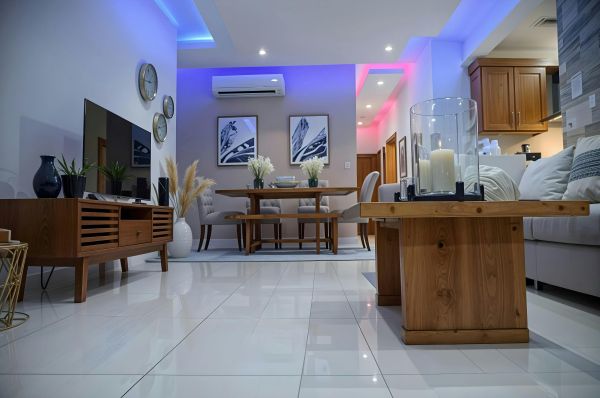Energy-Efficient AC Units: Saving Money While Staying Cool

Are you worried about your rising energy bills? There is no need to give up on buying an air conditioner to keep your energy costs down. The secret is in finding energy-efficient AC units. It means you can keep your AC running and not worry about your energy bills ticking higher every time you turn the unit on. What does it mean to have an energy-efficient AC unit? Let’s discover the qualities of an energy-efficient air conditioner and a buying guide to make your home cooler without the higher energy bills.
Why Switch to an Energy-Efficient AC Unit?
There is probably no other modern invention as important as air conditioners. These units keep your home cool in the summer to maintain a comfortable indoor temperature. However, not all AC units are the same.
Choosing an energy-efficient AC unit offers many practical advantages. The most obvious one is the ability to lower your energy bills. Energy-efficient AC units use less power, which can reduce energy costs, especially during peak summer months. These units are also more eco-friendly because lowering your energy consumption can lower your carbon footprint.
Over time, you can enjoy better reliability and an increased home value because many homeowners prefer energy-efficient features. With these things considered, let’s choose an energy-efficient air conditioner to keep your home cool without the high costs.
Energy Efficiency Ratings Explained
When buying an AC unit, you will find Energy Star ratings on the label. Have you wondered what these ratings mean? How can they help you decide the best energy-efficient unit to buy? Let’s find out!
SEER
SEER means Seasonal Energy Efficiency Ratio. These numbers refer to the amount of electricity required to eliminate a certain amount of heat from a given space. Higher SEER ratings mean higher efficiency for the unit.
As of 2015, the minimum SEER rating for new AC units is 14 in the South. However, you can find AC units with 25 SEER ratings. Meanwhile, older AC units have SEER ratings of 10 and below. It makes sense to buy newer units equipped with modern technologies designed for efficiency as they would be more practical to own in the long run due to the lower energy costs. While these AC units cost more upfront, you can save more.

COP
COP refers to the ratio of the AC unit’s cooling capacity vs the power input. A higher COP value equates to more efficiency and savings. This unit has a better cooling capacity for the same power input than others with a lower COP.
Energy Star Rating
The Energy Star rating is a government-backed symbol in the US that determines appliances’ energy efficiency. You can use this as a standard when evaluating an AC unit’s efficiency. The general rule is that the more stars, the more efficient the unit is. AC units with the Energy Star rating are guaranteed to be 10% more efficient than those without the rating.
How to Choose Energy-Efficient AC Units
Understanding the various features of an energy-efficient AC unit will help you choose the right unit for your home to enjoy increased efficiency.
Choose AC with Inverter Technology
An AC unit equipped with inverter technology offers better energy efficiency. You probably see this a lot when shopping for new AC units, especially modern ones, and wonder if it is really more efficient than traditional models. The answer is yes. AC units with inverter technology are a greener option as they are designed for higher efficiency.
Inverter technology adjusts the compressor speed based on the home’s cooling demands. Contrary, non-inverter AC units can only switch the compressor on or off and not adjust its speed based on the workload. As a result, they consume more energy.
With inverter technology, your AC unit can operate more efficiently because it does not consume more energy than it needs. This translates to lower energy usage and more savings in the long run.

Sizing the AC to Fit Your Cooling Needs
Many homeowners make the mistake of investing in an AC unit with a lower HP level, thinking that it would use less energy and mean more savings. However, an improperly sized AC unit will end up working harder to meet the space’s cooling demands, resulting in higher energy consumption.
The best way to invest in an energy-efficient AC unit is to match the size of the room with the unit's cooling capacity.
The first thing you must do is to determine the room size and layout. For example, connecting rooms with higher ceilings will take longer to cool than a single room. An improperly sized AC unit will prompt the compressor to work harder to generate enough cooling power to fill the room with cold air. On the other hand, oversized units can blast cold air into the room and then shut off once it reaches the desired temperature. The problem with oversized units is once they shut off and the temperature rises again, it will turn off shortly to maintain the ideal temperature. It creates a continuous cycling process that consumes a lot of energy.
You must also consider other factors that can cause the temperatures to rise, such as the amount of sunlight that enters the room and the number of windows or vents. Consider these factors to determine the appropriate size of the AC unit to achieve higher energy efficiency. Otherwise, your AC unit will work harder to achieve a comfortable cooling temperature and end up wasting power.
If unsure about what AC unit capacity is ideal for the room size, you can consult an expert AC technician. They can calculate the room size and other factors to determine the ideal load requirement. You can use this information to decide on the right AC unit that can efficiently cool your home or specific rooms in the house.
Consider Your Climate
Climactic factors should be considered when buying an energy-efficient AC unit. If you live in hotter climates, you need a more powerful unit that will be more efficient during hot weather conditions. On the other hand, if you live in areas with three climate zones, choose units that can offer heating and cooling capabilities.
A reverse cycle technology is an energy-efficient option for homeowners who live in three climate zones. It eliminates the need to install another heating system on top of your cooling units. With one system, you can enjoy heating and cooling, which adds to the overall system efficiency.
Energy Efficiency Ratings
Looking at an AC unit's energy efficiency ratings is the best way to gauge its energy consumption. You can compare the ratings for different types of AC units and brands to make an informed decision about which model or brand to buy.
Based on the information about how energy efficiency ratings are determined, a higher rating means higher efficiency. You can use this as a reference guide to save time and effort in analyzing the unit’s performance.
Energy-Saving Features
Aside from the energy efficiency ratings, you must also look for AC units with additional energy-saving features that optimize your energy savings. One example is an energy-saving mode. This feature automatically switches off the unit, which includes the compressor and the fan, once it reaches the ideal temperature to save power.
Another energy-saving feature is a programmable thermostat. A programmable temperature setting allows you to specify the ideal temperature at any given time of day, ensuring that your unit does not have to work harder once you achieve the desired temperature. For example, you can program the AC unit to provide maximum cooling at midday when you expect the outdoor temperature to be at its hottest. However, the programmed settings lower the AC power consumption toward the afternoon when the outside temperature drops and your cooling demand also lowers.
Programmable thermostats enhance your AC unit’s adaptability to external factors, allowing you to save electricity and lower your energy bills.
Type of Air Conditioner
There are various types of air conditioners, such as window, split, and ductless systems. Analyze the energy efficiency of each type of air conditioner and where they are best suited to match the cooling needs in your home or specific rooms in the house.
Tips to Keep Your AC Energy-Efficient
So, you have invested in an energy-efficient AC unit. Now, you won’t have to worry about your energy bills increasing because the unit does the hard work of ensuring you keep your energy consumption low. Right? Not quite! How you use your air conditioner is just as crucial in choosing the right unit. Follow these tips to maximize your AC’s energy efficiency.
Consult an AC Professional Before Installation
If you are planning to buy a new AC unit and want to enjoy higher efficiency, consult an expert for professional advice. They can provide recommendations based on your home or room size, location, and the most efficient type of air conditioner based on your needs and preferences.
Set Your Thermostat Efficiently
The ideal temperature to keep your home cool during the peak of summer is between 76 to 78 degrees F (24 to 26 C). It is the ideal thermostat temperature to comfortably cool your home without using more power.
Switch Off Your AC When It’s Cooler
This tip might be obvious, but it can be hard to remember when you’re so used to having one at home. However, you can save on energy bills when you switch off your AC unit at night when the temperature is much cooler or at certain times of the year when it is cooler than in the summer.
Open your windows to allow natural, fresh air into your home to keep it cool without over-relying on your AC unit to stay comfortable.
Switch Off Unnecessary Lights or Appliances
Do you have lights that can be switched off? Are you plugging in appliances that are not in use? Consider switching them off as they generate heat inside your home. When there is excess heat from these electrical appliances, your AC unit must work harder to remove that heat from inside your home.
Use Ceiling Fans
If you feel like your home isn’t cooling fast enough, most people would instinctively lower the temperature setting on their AC unit. However, you can consider turning on your ceiling fans instead to allow the proper circulation and distribution of cool air inside your home or within a specific room. You will often find that ceiling fans can effectively cool a space without making your AC unit work harder.
Properly Close or Seal Windows
Before switching your AC unit, check if all the windows and doors are properly closed. If any gaps allow cold air to escape from your home, you won’t be able to achieve your ideal indoor temperature. Not only does this allow cold air to escape, but it also brings in hot air from the outside. As a result, the AC unit must work doubly hard to reach and maintain the ideal temperature.
Clean the Air Filter Regularly
AC units have air filters that could collect debris and dust over time. Even if your AC unit is not yet due for regular maintenance, check the air filters regularly and clean them to remove any dust or debris. This is a crucial step in ensuring good airflow inside your home and that your AC unit is not overworked.
Keep Up With Regular Maintenance Schedule
Hire a professional AC technician to tune up and maintain your AC unit regularly. It is a small investment that could pay off big in the long run, as it helps extend your AC’s lifespan and keep it running optimally. Well-maintained AC units can achieve their highest efficiency potential compared to those in poor condition.
